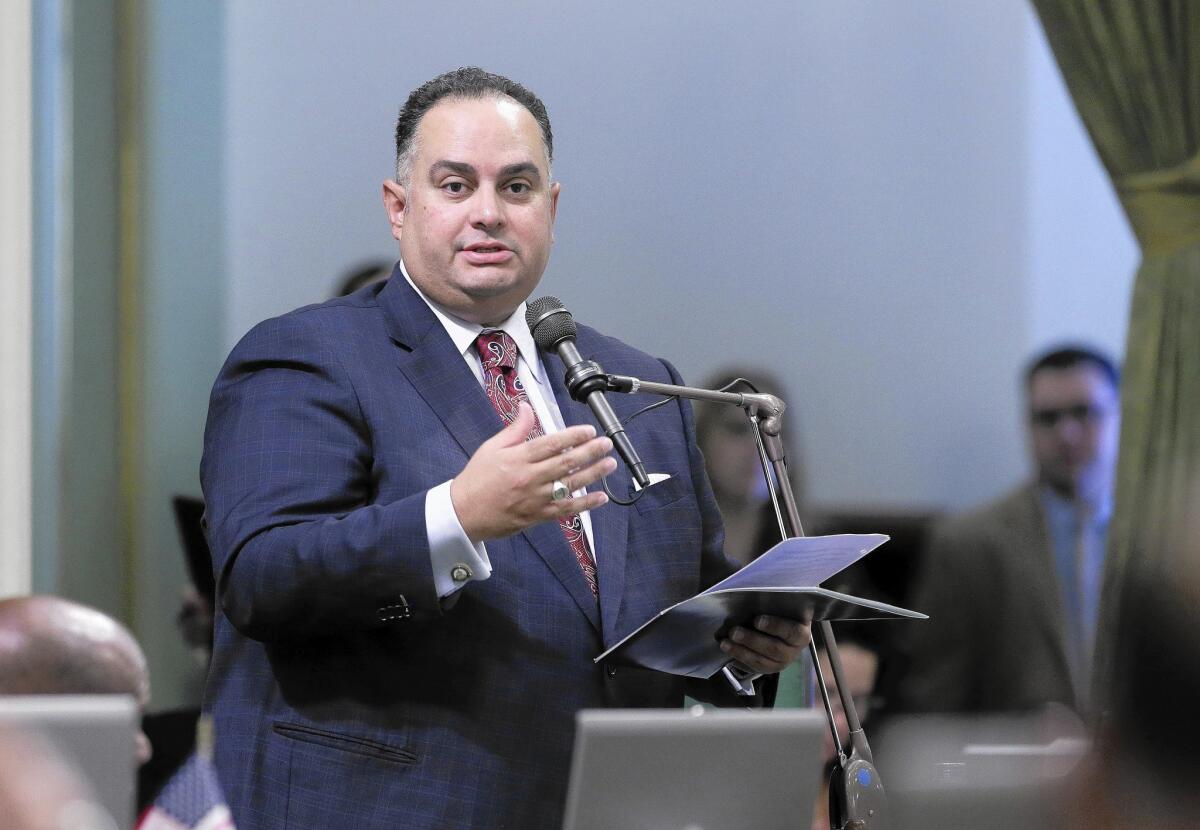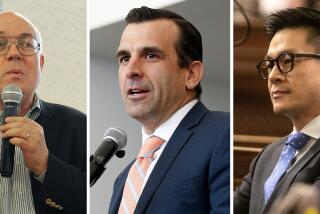Controller recount highlights concern about California election law

- Share via
Reporting from SACRAMENTO — In much the way surgeons need skilled hands and fighter pilots must have great eyesight, there is at least one key requirement for election workers handling the recount in California’s controller race: long attention spans.
Starting Friday, they will gather in government offices and sit four to a table, where ballots will be lined up for their review. One worker will read a voter’s decision, another will watch and two more will keep count.
They will do this thousands and thousands of times.
“It has to be people who can stay focused, because you can understand how boring it can get,” said Debra Porter, Imperial County registrar. And if the workers lose count, they’ll have to backtrack to make sure they get it right.
This tedious process is at the heart of what could become the largest recount in California history. It will also showcase a rarely discussed area of state law that observers and participants say fails to provide an equitable safeguard in close elections.
Assemblyman John A. Pérez called for the review after finishing 481 votes behind Betty Yee, a Board of Equalization member, in the June 3 primary. The two Democrats are battling for the chance to face off with Ashley Swearengin, the Republican mayor of Fresno, in the November general election.
Although recounts are intended to impartially weed out mistakes that could unfairly determine an election’s outcome, in California they are just another arena where political gamesmanship and fundraising can play a key role.
Unlike some other states, California doesn’t require that ballots be inspected in close elections. A candidate or any registered voter may request a review, but he or she must foot the bill, meaning the ability to double-check votes is dependent on the size of candidates’ wallets or the generosity of their campaign donors.
In addition, whoever asks for the recount can choose the counties where they want a new tally, so ballots in some areas of the state will receive closer scrutiny than in others.
“It’s just nutty,” said Rob Richie, executive director of FairVote, a Maryland-based organization that studies elections. “If the recount doesn’t include the whole state, we don’t know whether the right outcome happened.”
Across the country, recounts are rare in statewide contests, and it’s even rarer for them to tip the scales, according to a FairVote study released in 2011. Out of 2,884 statewide general elections from 2000 to 2009, there were 18 recounts, and only three changed an election’s outcome.
In races where more than 2 million ballots were cast, recounts shifted the margin by an average of .0156%. It’s a seemingly microscopic amount, but still large enough to potentially affect the California controller primary, where Yee is ahead of Pérez by only .01% in a race with more than 4 million votes.
Because California is heavily Democratic, whoever comes out on top has a good shot at becoming the next controller, one of the state’s top positions, with wide authority to conduct audits and manage public finances.
Secretary of State Debra Bowen, California’s top elections official, did not respond to requests for comment about the recount process.
Meanwhile, election officials are digging in for a long summer of double-checking ballots. Unlike in Florida in 2000, there won’t be any “hanging chads,” because punch cards aren’t used in California. Instead, workers will be checking whether ballots were accurately scanned by machines or improperly disqualified when sent through the mail.
There’s no deadline to finish the review, but there are time constraints. General election ballots are scheduled to be mailed out to military service members and voters living overseas by Sept. 5, 60 days before the Nov. 4 vote.
The recount will move sequentially through a list of 15 counties chosen by Pérez, starting in Kern and Imperial. All of them are places where he performed better than Yee in the primary, and he’s faced criticism for “cherry-picking” counties.
“What is the goal of a recount?” Yee said in an interview. “If the goal is to ensure every vote that was cast legally is counted correctly, it should be a much broader look.”
Pérez said he simply couldn’t afford a review in all 58 counties.
“If I could do the entire state and afford it, I would do it in a minute,” he said in an interview.
He said elected leaders should consider changes to California recounts so that ballot inspections would be automatically triggered in close races and candidates wouldn’t have to pay for them. (A statewide recount is estimated to cost $3 million, a tiny fraction of the state’s $108-billion general fund budget but a huge expense for a campaign.)
For now, Pérez said, he’ll “have to make the best of the situation that exists.”
If Pérez prevails in the recount, he will get his money back. However, he still needs to pay county officials up front for every day he wants the counting to continue.
“Like a lot of things in California elections, it comes down to who has more money,” said Kim Alexander, president of the California Voter Foundation. “When it comes to getting election results right, money shouldn’t matter.”
Pérez can stop the recount if he’s not making progress and decides it’s not worth the money, or if the new tally turns the tide in his favor.
But even then, the uncertainty may not end. Yee would still have the opportunity to launch a competing recount in different counties, continuing the battle.
“It’s a messy process,” said Paul Mitchell, vice president of Political Data, a nonpartisan firm that tracks voting patterns. “And I don’t think it inspires confidence from voters.”
Twitter: @chrismegerian
More to Read
Sign up for Essential California
The most important California stories and recommendations in your inbox every morning.
You may occasionally receive promotional content from the Los Angeles Times.











